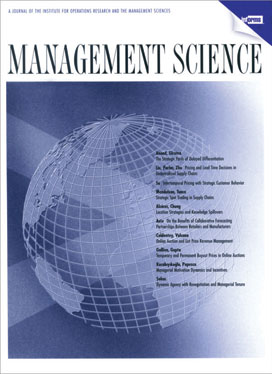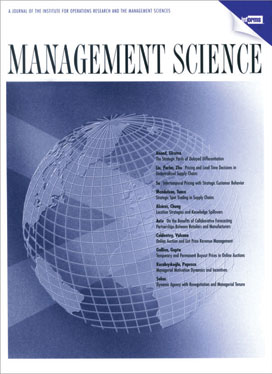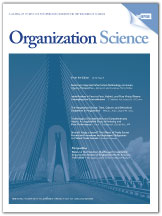Academic articles
Practitioner articles
Working papers
Books
Book chapters
Case studies
Other publications
Subject(s)
Economics, politics and business environment
Keyword(s)
Incentives, structural change, moral hazard, professional sports
JEL Code(s)
D82, J41, L14, M52
Volume
232
Journal Pages
258–278
ISSN (Online)
2366-049X
ISSN (Print)
0021–4027
Subject(s)
Economics, politics and business environment
Keyword(s)
productivity, information technologies, organizational practices, panel data
JEL Code(s)
O33, D22, D24
Volume
12
Journal Pages
1–39
Subject(s)
Economics, politics and business environment
Keyword(s)
telecommunications, access regulation, unbundling, investment
JEL Code(s)
C51, L59, L96
We provide evidence of an inherent trade-off between access regulation and investment incentives in telecommunications by using a comprehensive data set covering 70+ fixed-line operators in 20 countries over 10 years. Our econometric model accommodates: different investment incentives for incumbents and entrants; a strategic interaction of entrants' and incumbents' investments; and endogenous regulation. We find access regulation to negatively affect both total industry and individual carrier investment. Thus promoting market entry by means of regulated access undermines incentives to invest in facilities-based competition. Moreover, we find evidence of a regulatory commitment problem: higher incumbents' investments encourage provision of regulated access.
With permission of the University of Chicago Press
Volume
55
Journal Pages
189–216
Subject(s)
Economics, politics and business environment
Keyword(s)
market definition, shopping centre, externalities, characteristics approach
Volume
7
Journal Pages
421–431
Subject(s)
Strategy and general management
Keyword(s)
corporate social responsibility, competitive strategy, challenger brand, affective trust
This research builds on the complementary corporate social responsibility (CSR) literatures in strategy and marketing to provide insight into the efficacy of CSR as a challenger's competitive weapon against a market leader. Through an investigation of a real world CSR initiative, we show that the challenger can reap superior business returns among consumers who had participated in its CSR initiative, relative to those who were merely aware of the initiative. Specifically, participant consumers demonstrate the desired attitudinal and behavioral changes in favor of the challenger, regardless of their affective trust in the leader, whereas aware consumers' reactions become less favorable as their affective trust in the leader increases. Furthermore, participation, unlike mere awareness, transforms the nature of the consumer-challenger relationship from a transactional one to a communal, trust-based one.
© 2011 INFORMS
Volume
57
Journal Pages
1528–1545
ISSN (Online)
1526-5501
ISSN (Print)
0025–1909
Subject(s)
Technology, R&D management
Keyword(s)
innovation, commercialization, patents, multi-invention context
Volume
53
Journal Pages
47–79
Subject(s)
Economics, politics and business environment
Keyword(s)
competition policy, merger control, market definition, state aid, regulation
Volume
38
Journal Pages
287–314
Subject(s)
Marketing
Keyword(s)
CSR, marketing, corporate identity, consumer-company identification, identity alignment, marketing strategy
The paper integrates and builds on extant thinking in corporate marketing and CSR to provide an identity-based conceptualization of CSR. Based on this, it positions CSR as an optimal managerial tool for promoting alignment between multiple corporate identities (e.g., internal, external), which ultimately leads to key benefits for the company.
With permission of Emerald
Volume
45
Journal Pages
1353–1364
Subject(s)
Finance, accounting and corporate governance
Keyword(s)
default prediction, expected loss, recovery rate
In this paper we focus on modeling and predicting the loss distribution for credit risky assets such as bonds and loans. We model the probability of default and the recovery rate given default based on shared covariates. We develop a new class of default models that explicitly account for sector specific and regime dependent unobservable heterogeneity in firm characteristics. Based on the analysis of a large default and recovery data set over the horizon 1980-2008, we document that the specification of the default model has a major impact on the predicted loss distribution, while the specification of the recovery model is less important. In particular, we find evidence that industry factors and regime dynamics affect the performance of default models, implying that the appropriate choice of default models for loss prediction will depend on the credit cycle and on portfolio characteristics. Finally, we show that default probabilities and recovery rates predicted out-of-sample are negatively correlated, and that the magnitude of the correlation varies with seniority class, industry, and credit cycle.
© 2011 INFORMS
Volume
57
Journal Pages
1267–1287
ISSN (Online)
1526-5501
ISSN (Print)
0025–1909
Subject(s)
Strategy and general management
Keyword(s)
coordination, project work, knowledge work, technical work, open source software, lateral authority, communities of practice, community project, technical community, community forms
Project forms of organizing are theorized to rely upon horizontal as opposed to vertical lines of authority, but few have examined how this shift affects progression-how people advance in an organization. We argue that progression without hierarchy unfolds when people assume lateral authority over project tasks without managing people. With a longitudinal study of a mature, collectively managed open source software project, we predict the individual behaviors that enable progression to lateral authority roles at two different stages. Although technical contributions are initially important, coordination work is more critical at a subsequent stage. We then explore how lateral authority roles affect subsequent behavior-after gaining authority, individuals spend significantly more time coordinating project work. Our research shows how people progress to the center as opposed to up a hierarchy, and how progression differs by stage and specifies the theoretical relationship between lateral authority roles and the coordination of project work.
© 2011 INFORMS
Volume
22
Journal Pages
961–979




